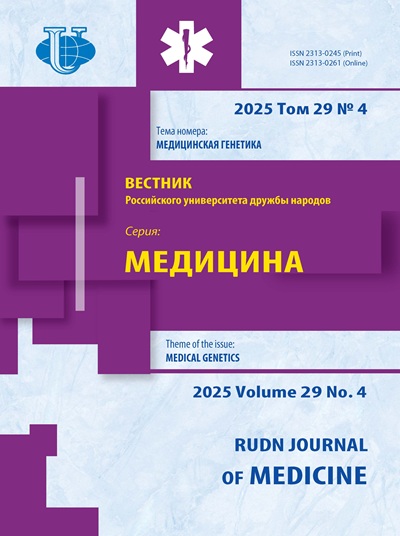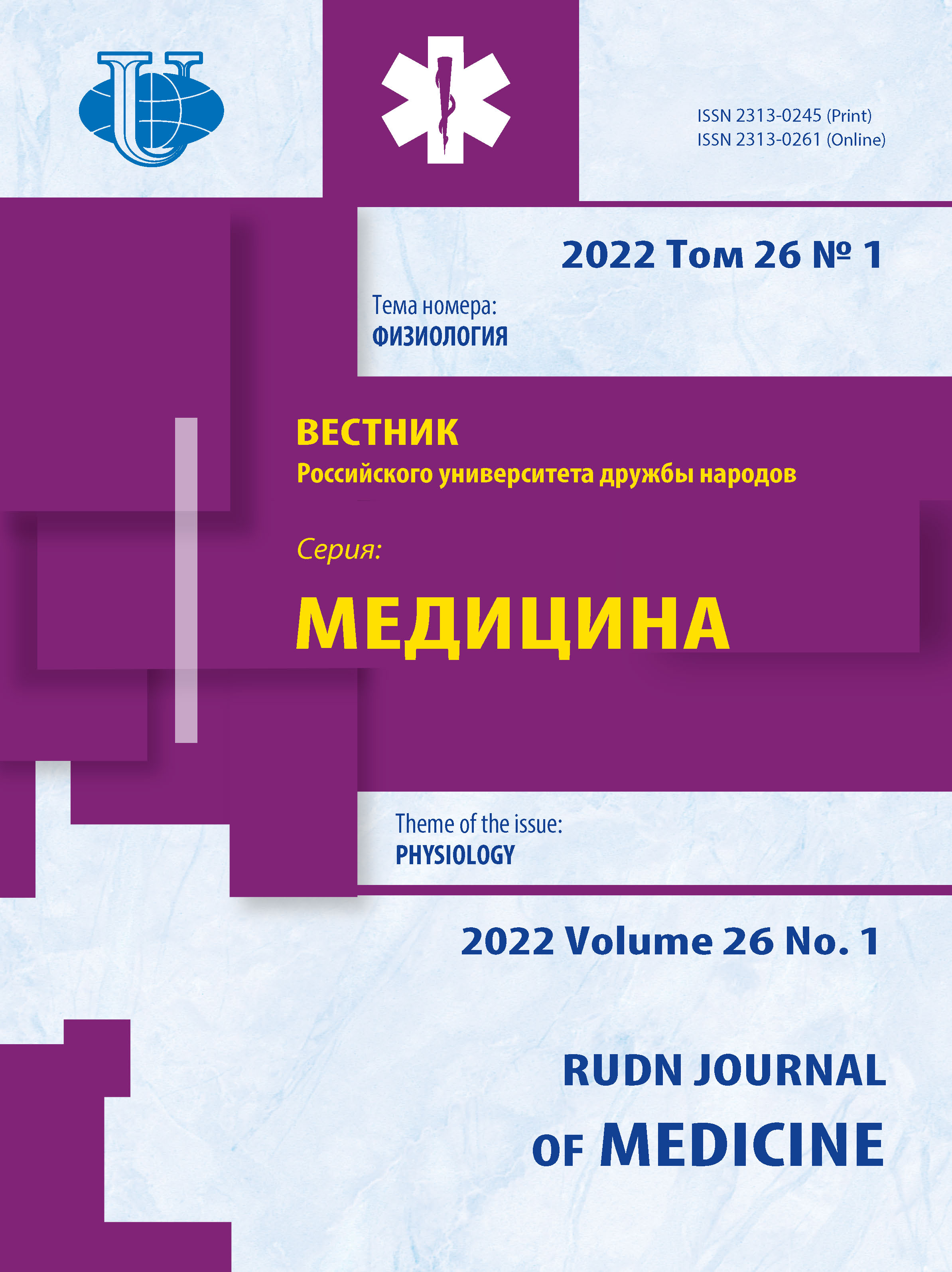Depression prevalence in cancer patients: a cross sectional study
- Authors: Jahagirdar R.1
-
Affiliations:
- Zydus Medical College and Hospital
- Issue: Vol 26, No 1 (2022): PHYSIOLOGY
- Pages: 103-108
- Section: PSYCHIATRY
- URL: https://journals.rudn.ru/medicine/article/view/30542
- DOI: https://doi.org/10.22363/2313-0245-2022-26-1-103-108
- ID: 30542
Cite item
Full Text
Abstract
Relevance. Depression has substantial effects on cancer patients’ quality of life. Estimates of its prevalence vary widely. Aim of the study was to evaluate the prevalence and severity of depression in cancer patients. Materials and Methods . All cancer patients admitted at tertiary care Dr. Vithalrao Vikhe Patil Foundation’s Medical College Hospital (Dahod, Gujarat, India) between December 2015 to December 2016 were included in this study. All subjects gave informed consent to participate in the investigation and personal data processing. Depression in cancer patients was screened using the Mini International Neuropsychiatric Interview (MINI) questionnaire and administered the Hamilton Depression Rating Scale for severity of depression. Results and Discussion. Out of 128 cancer patients screened, 44 (34 %) patients were identified to have depression using MINI. Among them mild to moderate depression was seen in 60.4 % depressed patients, and severe to very severe depression was present in 39.4 % patients. Further analysis showed that the marital status, monthly income and literacy had an impact on the level of depression. Conclusion . The psychological impact of cancer is considerable. The failure to detect and treat elevated levels of psychological distress might jeopardize the result of cancer therapies, decrease patient’s quality of life and increase health care cost. The lack of identifiable risk factors makes the task of diagnosing psychiatric conditions in cancer patients a difficult one. Early recognition of psychiatric distress for the identification of depression is an integral part in the comprehensive management of cancer patients.
About the authors
Rohan Jahagirdar
Zydus Medical College and Hospital
Author for correspondence.
Email: drjahagirdarrohan@gmail.com
ORCID iD: 0000-0001-8287-9562
Dahod, Gujarat, India
References
- Vos T, Flaxman AD, Naghavi M. Years lived with disability (YLDs) for 1160 sequelae of 289 diseases and injuries 1990-2010: a systematic analysis for the Global Burden of Disease Study 2010. Lancet. 2012;380:2163-2196.
- Massie MJ, Holland JC. Overview of normal reactions and prevalence of psychiatric disorders. In: Holland JC, Rowland JH, editors. Handbook of Psycho-Ocology: Psychological Care of the Patient with Cancer. New York: Oxford University Press; 1989. p. 273-82.
- Colón EA, Callies AL, Popkin MK, McGlave PB. Depressed mood and other variables related to bone marrow transplantation survival in acute leukemia. Psychosomatics. 1991;32:420-5.
- Krebber AM, Buffart LM, Kleijn G, Riepma IC, de Bree R, Leemans CR, Becker A, Brug J, van Straten A, Cuijpers P, Verdonck-de Leeuw IM. Prevalence of depression in cancer patients: a meta-analysis of diagnostic interviews and self-report instruments. Psychooncology. 2014;23(2):121-30.
- American Psychiatric Association. Diagnostic and Statistical Manual of Mental Disorders. 4 th ed. Washington, DC: American Psychiatric Association; 1991. 362 p.
- Pettersson A, Modin S, Wahlström R. The Mini-International Neuropsychiatric Interview is useful and well accepted as part of the clinical assessment for depression and anxiety in primary care: a mixed-methods study. BMC Fam Pract. 2018;19:19.
- Worboys, Michael. The Hamilton Rating Scale for Depression: The making of a «gold standard» and the unmaking of a chronic illness, 1960-1980. Chronic illness. 2013;9(3):202-219.
- Naser AY, Hameed AN, Mustafa N. Depression and Anxiety in Patients With Cancer: A Cross-Sectional Study. Front Psychol. 2021;12:585534.
- Walker J, Hansen CH, Martin P, Sawhney A, Thekkumpurath P, Beale C, Symeonides S, Wall L, Murray G, Sharpe M. Prevalence of depression in adults with cancer: a systematic review. Ann Oncol. 2013;24(4):895-900.
- Baraki AG, Tessema GM, Demeke EA. High burden of depression among cancer patients on chemotherapy in University of Gondar comprehensive hospital and Felege Hiwot referral hospital, Northwest Ethiopia. PLoS ONE. 2015(8): e0237837. https://doiorg/10.1371/journal.pone.0237837
- Niedzwiedz CL, Knifton L, Robb KA. Depression and anxiety among people living with and beyond cancer: a growing clinical and research priority. BMC Cancer. 2019;19:943
- Mishra SK, Mohapatra PK, Bhattacharya K, Gupta T, Agarwal JP. Prevalence of psychiatric disorder in asymptomatic or minimally symptomatic cancer patients on treatment. J Cancer Res Ther. 2006;2:136-139.
- Que JC, Sy Ortin TT, Anderson KO. Depressive symptoms among cancer patients in a Philippine tertiary hospital: Prevalence, factors, and influence on health-related quality of life. J Palliat Med. 2013;16:1280-1284.
- Popoola AO, Adewuya AO. Prevalence and correlates of depressive disorders in outpatients with breast cancer in Lagos, Nigeria. Psychooncology. 2012;21:675-679.
- Yen NTK, Weiss B, Trung LT. Caseness rates and risk factors for depression among Vietnamese cancer patients. Asian J Psychiatr. 2016;23:95-98.
- Pandey M, Devi N, Thomas BC. Distress overlaps with anxiety and depression in patients with head and neck cancer. Psychooncology. 2007;16:582-586.
- Sharma A, Zhang J. Depression and its predictors among breast cancer patients in Nepal. Asean J psychiatry. 2015;16:106-115.
- El-Hadidy MA, Elnahas W, Hegazy MAF. Psychiatric morbidity among Egyptian breast cancer patients and their partners and its impact on surgical decision-making. Breast Cancer. 2012;4:25-32.
- Yen NTK, Weiss B, Trung LT. Caseness rates and risk factors for depression among Vietnamese cancer patients. Asian J Psychiatry. 2016;23:95-98.
- Walker ZJ, Xue S, Jones MP, Arun V. Ravindran. Depression, Anxiety, and Other Mental Disorders in Patients With Cancer in Lowand Lower-Middle-Income Countries: A Systematic Review and Meta-Analysis. JCO Global Oncology. 2021:7,1233-1250.
Supplementary files















